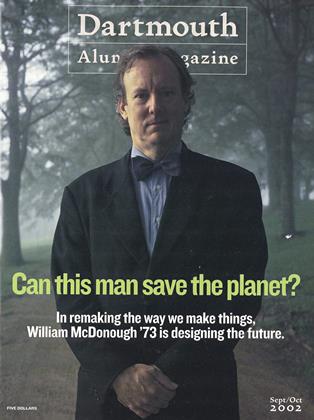Dartmouth was and remains for all of us both an educational and a social experience. Obviously the clubs provide continued social opportunities for alumni and friends of the College, but many also have a strong educational component. For years the Alumni Relations Office has supported cubs by providing professors, educational materials and other resources to sponsor academic seminars around the country. Roberta Moore, director of Alumni Continuing Education and Travel, is committed to the mission of "sharing the intellectual excitement of Dartmouth by connecting alumni and friends to each other, the College and the world."
Generally, the College covers the cost of professors' travel, printed materials and advertising. The clubs cover the cost of the venue, meals and a stipend for the professors.Among other things, Roberta is considering combining the Alumni Relations' speaker program for clubs' annual meetings with academic presentations, as well as more regional programming where several clubs would co-sponsor an event.
Seminars can range from half-day academic presentations to long-weekend "mini Alumni Colleges." The Dartmouth Club of Suburban New Jersey has run a full-day seminar on a Saturday in January for many years. The program consists of a morning lecture session by two professors, lunch and then afternoon discussion among the attendees and the professors. The seminar is held in the Woodrow Wilson School at Princeton, regularly attracting nearly 200 alumni and friends throughout New Jersey and from Philadelphia. While some build their seminar around a particular professor, "it is critical to get a hot subject and then get a professor to fit that," according to the New Jersey Club's seminar coordinator Gren Bunker '57. "You need something which is very timely," he adds. And sometimes you just get lucky—this past January the seminar topic was on war and conflict in the modern world. It had been developed before the September 11 tragedy and turned out to be extremely timely.
Mickey Stuart '71 has the opposite view: "The less relevant the subject matter the better." Mickey brings his experience running the Alumni College in the mid-'70s to the Dartmouth Club of Dallas and, as continuing education chairperson, believes you cannot time your seminar to current events because they change so quickly. He keeps an eye out for outstanding faculty who complement each other, such as Deborah Nichols and John Watanabe, who led a seminar titled "Mexico's Enduring Past: The Aztecs" in Dallas last March. Mickey uses facilities at the Greenhill School and has about 80 attendees each year.
Firmly in the middle is Mark Anderson '69: "I have no philosophy one way or the other. I tiy to choose a topic that has wide appeal and hope for the best." The Dartmouth Club of the Midwest has a full day seminar each winter. Often the topic is literature, featuring popular professors such as Donald Pease and William Cook, covering Dartmouth writers as diverse as Norman Maclean '24, Ted "Dr. Seuss" Geisel '25 and Louise Erdrich '76. The seminars usually are held on the campus of the University of Minnesota and attract an average of 40 people. "The seminar attracts a different group of people who don't usually attend other club events," reports Mark's co-chair Ron London '67.
The Dartmouth Club of Los Angeles started its seminar program seven years ago and it has grown steadily. President Craig Douglass '78 suggests paying attention to "the four Ps: preparation, promotion, (targeted) population and place (venue)." Craig strongly recommends holding it in an academic facility "rather than the dreaded hotel venue."
For details, or help in arranging an academic event, contact Roberta Moore toll-free at (888) 228-6068
2200 Wells Fargo Center, 90South Seventh St., Minneapolis, MN 55402; (612)766-6810; (612) 766-1600 (fax); dryan@faegre.com
 View Full Issue
View Full Issue
More From This Issue
-
 Cover Story
Cover StoryDesigning the Future
September | October 2002 By Brian Dumaine -
 Feature
FeatureAn Honor, To a Degree
September | October 2002 By JAMES O. FREEDMAN -
 Feature
FeatureThe Club Scene
September | October 2002 -
 Article
ArticleSeen & Heard
September | October 2002 -
 Personal History
Personal HistoryRiver Dance
September | October 2002 By Jonathan Agronsky ’68 -
 Article
ArticleAcademic Aesthetics
September | October 2002 By President James Wright
Dennis Ryan '81
-
 Class Notes
Class NotesClubs
Sept/Oct 2001 By Dennis Ryan '81 -
 Class Notes
Class NotesClubs
Jan/Feb 2002 By Dennis Ryan '81 -
 Class Notes
Class NotesClubs
Mar/Apr 2002 By Dennis Ryan '81 -
 Class Notes
Class NotesClubs
July/Aug 2002 By Dennis Ryan '81 -
 Class Notes
Class NotesClubs
Jan/Feb 2003 By Dennis Ryan '81 -
 Class Notes
Class NotesClubs
May/June 2003 By Dennis Ryan '81
Class Notes
-
 Class Notes
Class Notes1949
SEPTEMBER 1989 By Bruce B. Crawford -
 Class Notes
Class Notes1911
MAY 1965 By NATHANIEL G. BURLEIGH, JOSHUA B. CLARK -
 Class Notes
Class Notes1928
March 1956 By OSMUN SKINNER, CRAIG B. HAINES, CHARLES F. BRUDER III -
 Class Notes
Class Notes1959
NOVEMBER 1996 By Richard A. Masterson -
 Class Notes
Class Notes1940
MARCH 1982 By Richard J. Goulder -
 CLASS NOTES
CLASS NOTES1988
SEPTEMBER | OCTOBER 2023 By Tory Woodin Chavey

